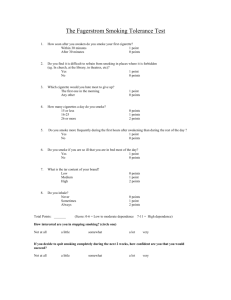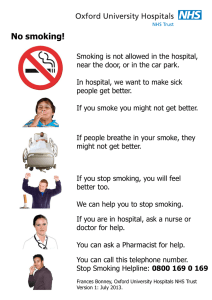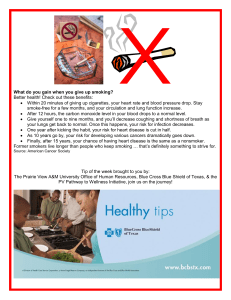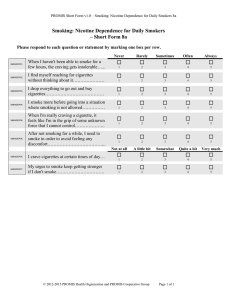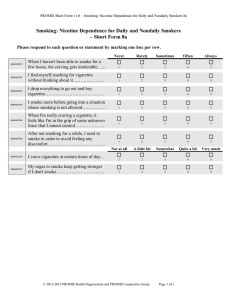Newport City Council Fostering service smoking policy
advertisement
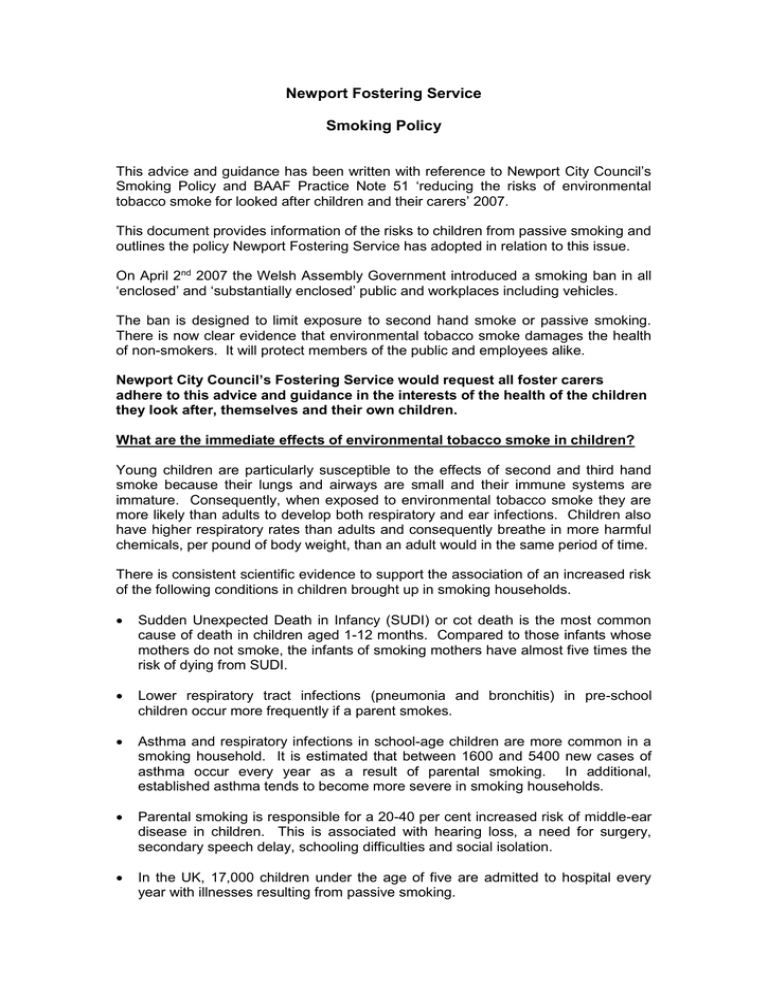
Newport Fostering Service Smoking Policy This advice and guidance has been written with reference to Newport City Council’s Smoking Policy and BAAF Practice Note 51 ‘reducing the risks of environmental tobacco smoke for looked after children and their carers’ 2007. This document provides information of the risks to children from passive smoking and outlines the policy Newport Fostering Service has adopted in relation to this issue. On April 2nd 2007 the Welsh Assembly Government introduced a smoking ban in all ‘enclosed’ and ‘substantially enclosed’ public and workplaces including vehicles. The ban is designed to limit exposure to second hand smoke or passive smoking. There is now clear evidence that environmental tobacco smoke damages the health of non-smokers. It will protect members of the public and employees alike. Newport City Council’s Fostering Service would request all foster carers adhere to this advice and guidance in the interests of the health of the children they look after, themselves and their own children. What are the immediate effects of environmental tobacco smoke in children? Young children are particularly susceptible to the effects of second and third hand smoke because their lungs and airways are small and their immune systems are immature. Consequently, when exposed to environmental tobacco smoke they are more likely than adults to develop both respiratory and ear infections. Children also have higher respiratory rates than adults and consequently breathe in more harmful chemicals, per pound of body weight, than an adult would in the same period of time. There is consistent scientific evidence to support the association of an increased risk of the following conditions in children brought up in smoking households. Sudden Unexpected Death in Infancy (SUDI) or cot death is the most common cause of death in children aged 1-12 months. Compared to those infants whose mothers do not smoke, the infants of smoking mothers have almost five times the risk of dying from SUDI. Lower respiratory tract infections (pneumonia and bronchitis) in pre-school children occur more frequently if a parent smokes. Asthma and respiratory infections in school-age children are more common in a smoking household. It is estimated that between 1600 and 5400 new cases of asthma occur every year as a result of parental smoking. In additional, established asthma tends to become more severe in smoking households. Parental smoking is responsible for a 20-40 per cent increased risk of middle-ear disease in children. This is associated with hearing loss, a need for surgery, secondary speech delay, schooling difficulties and social isolation. In the UK, 17,000 children under the age of five are admitted to hospital every year with illnesses resulting from passive smoking. The evidence for some of these conditions is dose-related – the greater the number of cigarettes smoked by the adults, the greater the risk. The risks to children will also be increased by the frequency of visits of smoking relatives and family friends. What are the implications of becoming a smoker whilst being looked after? The World Health Organisation (WHO) (1999) reported that children living with parents who smoke are nearly three times more likely to be smokers than those whose parents do not smoke. Children of smokers are more likely to take up the habit because they copy the behaviour of adults. Growing up in a household where adults smoke often means that children perceive smoking as the ‘norm’. Their parents’ approval or disapproval of the habit is a significant factor in determining whether a child will eventually become a smoker. Many young people come into the care system as smokers. Others only become smokers whilst being looked after. The health implications for all these young smokers are serious and those responsible for their welfare should do everything that they can to help them quit the habit. The earlier in life that children start smoking, the greater the risk of developing heart disease and lung cancer in later life. Children who smoke are between two and six times more susceptible to coughs, wheeziness, and shortness of breath and glue ear than those who do not smoke. Young smokers take more time off school than non-smokers. They are less physically fit than other children and are slower at both sprints and endurance running. Clearly as a responsible Authority we must do all we can to reduce the risks of passive smoking on the children we look after and do all we can to discourage those children who do smoke from continuing to do so. We fully acknowledge that many excellent substantive carers smoke. There is also a national shortage of both foster carers and adopters. Despite this, we need to give the protection of the health of children in our care a high priority and will, in the future, have to balance the positive elements of any placements against the negative impact of smoking. Newport Fostering Service policy on smoking No child under the age of 5 years will be placed with carers who smoke. This standard applies to both general carers and kinship carers. This is because of the particularly high health risks for very young children and toddlers who spend most of their day physically close to their carers. Electronic cigarettes or pipes would be classed the same as normal cigarettes and this is based on Government research and subsequent recommendations. All children with a disability which means they are often physically unable to play outside, all children with respiratory problems such as asthma and all those with heart disease or glue ear should not be placed with smoking families. In all long-term fostering, kinship and adoptive placements, the additional health risks to the child of being placed in a smoking household need to be carefully balanced against the available benefits of the placement for the child. This is because the significant risks of exposure to passive smoking increase with time. Children from non-smoking birth families should not be placed with substitute carers who smoke. It is illegal for carers to buy cigarettes for adolescents. Cigarettes should never be used as a reward for good behaviour in adolescents Don’t smoke around children or permit others to do so. Their lungs are particularly susceptible to smoke. Keep your home smoke-free. Because smoke lingers in the air, children may be exposed to smoke even if they are not around while you are smoking. Smoke only outside the house. Never smoke in the car, the high concentration of smoke in a small, closed space greatly increases the exposure of other passengers. Providing information on the effects of passive smoking in children is available Providing information on the effects of smoking on adult health is available Providing regular training and information for foster panel Advertising local and national NHS services for stopping smoking is available Discussing smoking risks as a routine part of the recruitment process and at every review for all foster carers. Giving consideration to the smoking habits of other family members and friends who visit regularly, e.g. grandparents or older children who no longer live at home should also be part of these discussions. Carers who have successfully given up smoking for 12 months can then be considered for high risk groups - children under five, children with a disability, chest problems, heart disease or glue ear . This is because relapse rates in the first three to six months are high, after six months the risk of relapse is less and after 12 months most people will be permanent non-smokers. After 10 years of not smoking an applicant is classed as a non-smoker for insurance purposes. Carers who smoke should receive extra information about the risks of burns and fires from smoking. Fire and burns are the leading cause of death in the home for children. In the UK 10 per cent of fires ignite with smoking related material and cause between 130 and 180 deaths annually, or one in three of all deaths from fires (Department of Health, 2001) Local authorities and other fostering service providers should move progressively to a situation where no more smoking carers are recruited. This will not only improve the health of some very vulnerable children but will protect the agencies from potential legal action in the future. April 2014
